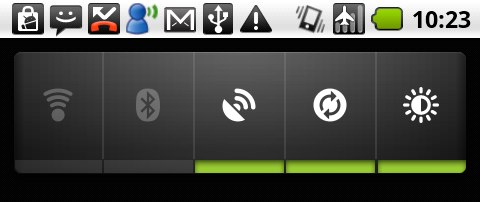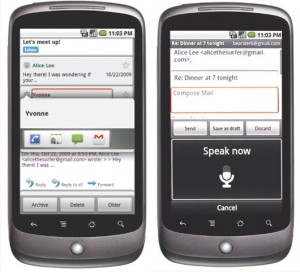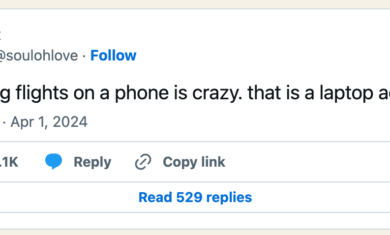As many of you already know, I recently switched from my Apple iPhone 3GS to the Nexus One (running Google’s “Android” operating system). The reviews I’d read essentially say that if your life is in Google (Gmail, Google Calendar, Google Voice, etc), it’s a smart move to make. I agree.
However, it’s certainly not better than the iPhone in every category. I’ll try to break some of those down. The main difference I noticed is that the iPhone is more polished (smoother scrolling, etc) while Android has more features. The iPhone OS 4.0 update coming this summer will catch up to some of those, but Android will still have a solid lead.
This one is easy; if you use Gmail, it is awesome
on the Nexus One. The iPhone mail app is very nice, but doesn’t have any of the Gmail specific tools in it (conversations, starring, etc). Having all of that on the Nexus is wonderful. If you you any provider other than Gmail, then it’s essentially a tie. Both phones have solid mail apps that do a nice job.
Customization
The new iPhone update will finally allow users to set wallpaper behind their icons, but Android can already do that. In fact, you can even set “live wallpaper”, which is animated and reacts to your touch. It’s neat, but it’s a battery drain and it’s pretty much useless. However, Android also allows you to put widgets on your screen to show news, weather, tweets, etc. They’re very slick, and iPhone has nothing that compares to it.
The other neat thing is that applications are given more flexibility to customize other parts of your system that the iPhone doesn’t allow. For example, when I plugged my phone into my car (Ford’s SYNC system), I always had to tell the phone to “mount” to the system. It was a single click, but got old. So, I found an app that could do it automatically. The way Apple controls their applications, it would be impossible to write an app that does something like that.
Applications
Apple certainly has a ton more, but Android covers 95% of what you’d need. I miss a few applications (such as “Words With Friends”) and others are still pretty weak (like Evernote), but all in all the selection is pretty solid.
Speed
Technically, the Nexus is a faster phone but they feel about the same. Once Android 2.2 “Froyo” arrives on the Nexus, it’ll certainly take the lead. Of course, the new iPhone is due out soon and will likely leapfrog the Nexus. These kinds of battles are great for consumers!
Battery Life
In general, battery life is roughly the same. However, the Nexus gives you two nice advantages:
- It’s a removable battery. This means you could carry an extra around with you, or replace yours if it goes bad. No such options with the iPhone.
- There are various “power control” widgets you can use on Android. You can have a single tap to turn on/off things like wifi, bluetooth, gps, etc. Making it so easy means that I can leave those items off when I don’t need them (and save precious battery life). With the iPhone it’s a few more taps to toggle them, so I usually just left them all on.

Camera
The Nexus has a considerably better camera (5 megapixel vs 3.2 megapixel), but they really give similar quality shots. I think phones are about to the point where they need bigger and better lenses to take advantage of the increased resolution, which is tough to do when it’s a fight for the skinniest phone.
Music
With the Nexus, you can just drag and drop music onto your phone. You can even drop files into folders like “notifications” and “ringtones” to set those up. Much easier than the cumbersome mess of iTunes.
However, iTunes makes it easier to purchase and load music, and it’s much easier to load podcasts. Also, the iPhone music player blows away the one on the Nexus. The Nexus music player is adequate, but no where near as nice as the iPhone player.
Conclusion
So, should you trade your iPhone for a Nexus One? Probably not. If money and availability were no factor, I’d suggest that around 75% of the country should have iPhones and the other 25% should have Android devices. The Nexus is better for geekier users, but each release is bringing it more mainstream. My guess is that those numbers will flip in a few years (75% should have Android), but the iPhone will always have a place due to it’s simplicity and ease of use. Time will tell…
Which do you prefer, and why?




